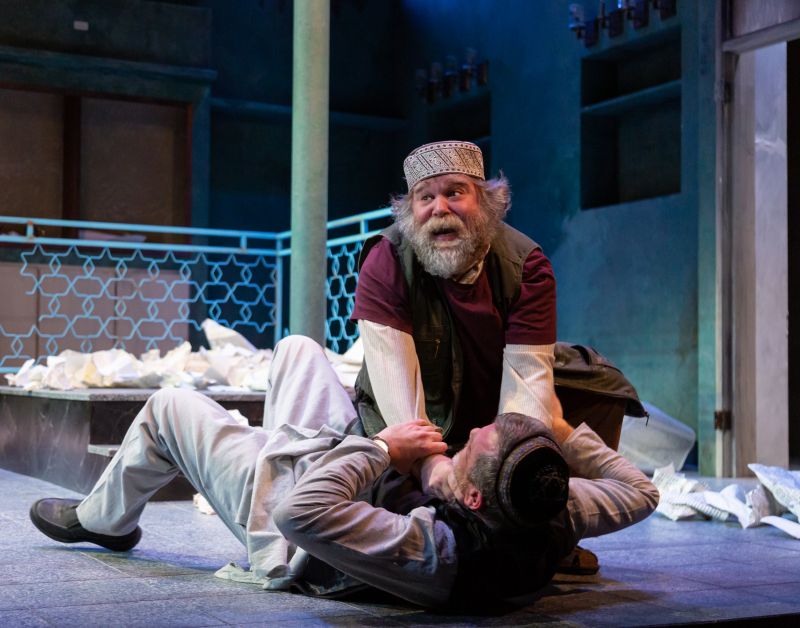
Photo by Ryan Maxwell Photography
Takoma Park-based actor Sasha Olinick finds his work in the rehearsal room and on stage has deep connections to his Judaism.
“The idea of storytelling is fundamental” in both theater and Jewish practice, he said last week, prior to taking the stage at the in “Two Jews Walk Into a War….” at the Edlavitch D.C. Jewish Community Center’s Theater J.
The two-man dramedy nods to vaudeville shtick, but is based on torn-from-the-headlines circumstances of the last two remaining Jews in Afghanistan.
“This character [I play] has a line about after they’ve just finished the book of Genesis that [Genesis] would make a great TV miniseries,” Olinick said. “I remember being really intrigued in Hebrew school by the stories of Genesis. I think the Torah as a form of storytelling is very similar to theater.”
While Olinick happens to be a regular performer at Theater J, appearing in nine productions there in recent years, he has made the rounds of other major Washington-area theaters including The Kennedy Center, Arena Stage, Folger Shakespeare Library, Mosaic Theater, Olney Theatre Center, Round House Theatre and Imagination Stage.
With a degree in American civilization from Brown University, he originally expected to teach, like both his parents, and only discovered the call of the stage later in college. Following a MFA in acting from Trinity Rep/Brown, Olinick found his way to the District and has built a theater career here playing various roles from Maurice in “Beauty and the Beast” to Friar Lawrence, Mozart, Albert Einstein, George Washington and Mendel from “Fiddler on the Roof,” as well as roles in premieres and contemporary works throughout the region.
These days, Olinick sports a beard and tousled salt-and-pepper hair that would be the envy of Einstein or Mozart. He isn’t concerned, though, about being typecast, even after playing Einstein twice.
“One thing that you find out as an actor as you get older is you end up playing yourself more and more, or something closer to yourself.”
In fact, one of his recent stretches was this past summer as an evangelical homophobic father in Mosaic Theater’s “In His Hands.”
“While there’s a lot to be gained by having to play someone who’s so different from yourself, it’s also exciting to see reflections of yourself in the characters you’re playing,” Olinick added.
This month, he’s Zebylan, a middle-aged Afghani-Jewish man in bullet-riddled Kabul. “It’s very, very loosely based on the true story of the last two known Jews in Kabul …. They were in the news, in 2005, 2006 …. They were trying to keep the congregation going, but they never spoke to one another.” Like the old Jewish joke abut two Jews and three opinions, Zeblyan and his compatriot Ishaq can’t agree on anything, except that they need to maintain the synagogue and write a Torah, from memory.
“There is something romanticized about their commitment to stay in Kabul, in a really hostile environment,” the actor said, noting that they believed Afghanistan was their home. “I think the playwright wanted to address the idea of fading Jewish communities in various parts of the world.”
At the same time, writer Seth Rozin wrote “Two Jews Walk Into a War” in the tradition of Neil Simon’s “The Odd Couple.” But it has also been compared to “Waiting for Godot.” The play asks audiences to wrestle with existential Jewish questions: What makes us Jewish if there is no Torah, no minyan, no tallit and tefillin? And most important, how can one be Jewish without a community?
Olinick is a member of Fabrangen, a chavurah community that meets on Shabbat in the District’s Shepherd Park neighborhood, He occasionally uses his bass/baritone voice to lead the Torah servi1ce or parts of the High Holiday services.
“Another thing that attracts me to both being a Jew and being an actor is a real sense of the collective aspect of both [theater and synagogue] — that they can’t exist without an audience,” Olinick said. “Yes, we’ve found forms for streaming to deal with COVID, but nothing will replace having performer and audience in the same space. That makes me think of the idea of a minyan and the importance of being with the community to pray; that’s a hugely significant similarity.”
Lisa Traiger is WJW’s arts correspondent.






Thank you Lisa. Your work is much appreciated for bringing such diverse art and theater works to the attention of audiences that may be of different cultures and communities.
You have a keen eye and great descriptive skills. Hope to read more of your reviews.